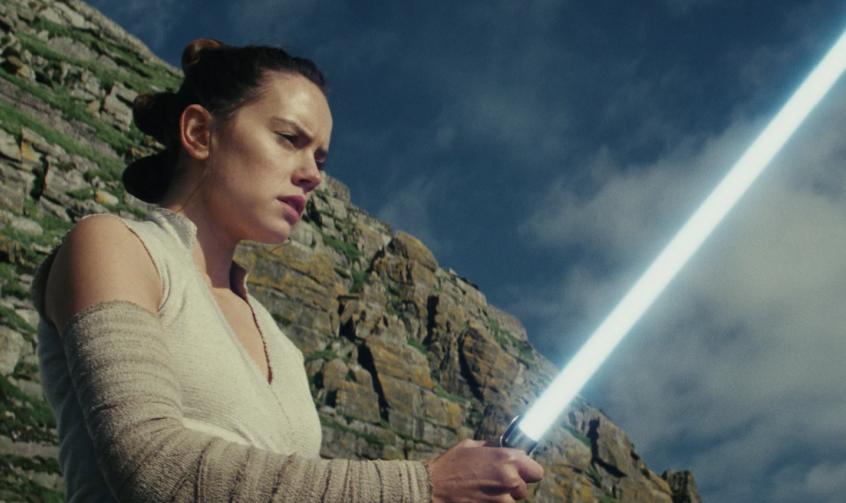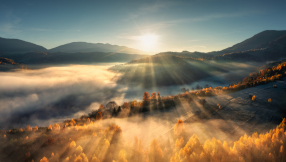The problem facing some movies is the overwhelming sense of expectation. The more hyped, the more hotly-anticipated a film is, the greater the mountain of first impressions it has to climb, and the higher the chance of fan disappointment. And movies don't come more drenched in marketing-and-nostalgia-generated excitement than official entries in the Star Wars series.
Two years after the launch of a brand new space opera trilogy with The Force Awakens, Disney and Lucasfilm have returned again with the return of Luke Skywalker, the eponymous Last Jedi. Given all the Lego sets, breakfast cereal tie-ins and carefully-co-ordinated social media campaigns, there's certainly no film this year that's been given a bigger build-up.

With those expectation levels in mind, fans will be hoping for The Last Jedi to explode into life from the first moment. It doesn't. Although it has a fair share of upbeat sequences, the first hour of Rian Johnson's first Star Wars movie is surprisingly slow-moving and restricted in its scale. In the opening acts of each of the last seven instalments, we've been slung across space, thrown into the heat of battle and given a sense of the epic canvas on which the story is being told. Yet here there's none of that, as Johnson allows an uncharacteristically limited story to unfold, before suddenly beginning to move through the gears in an action-packed second half. Which might feel like an odd place to start a review, but I think it helps to explain why the film just feels a bit... strange.
It's not necessarily a bad thing. While 2015's The Force Awakens felt at times like a remake of the original Star Wars, this feels genuinely different, and certainly doesn't retread The Empire Strikes Back territory. With the greatest effort made to avoid spoilers, this is the story of the rebellious Resistance's last stand against the evil First Order, led by the monstrous Supreme Leader Snoke (Andy Serkis). As ever, evil is attempting to snuff out good from the universe, but this time it really does seem that it could happen. In a last desperate attempt to avert annihilation, Rey (Daisy Ridley) has sought out original hero Luke (Mark Hamill) to train her in the Jedi powers she has begun to discover, and hopefully to join the revolution. Meanwhile General Leia (Carrie Fisher) is trying hard to evade the destruction of her entire fleet by Snoke's sneering General, Hux (Domhnall Gleeson) and evil apprentice, Kylo Ren (Adam Driver). Yet despite the size of the spaceships, the cannons and the stakes involved, it's still a peculiarly narrow story. It's as if Johnson, who cut his teeth on interesting storytelling pieces like Brick, is trying to make a real drama in the midst of the Star Wars franchise.
That said, the second half of the film really does pay off, with a series of memorable and exciting sequences that feel original even in the context of a long-running series. The final, epic battle in particular, beautifully shot against a truly innovative landscape, is continuously and eye-poppingly beautiful; another moment which takes place in total silence is sticks in both the heart and the mind. The Last Jedi is possibly the most different film in the series, and yet it's also stuffed full of scenes that might go on to be regarded as classic moments.
There are plenty of interesting themes, as you might imagine from a more cerebral Star Wars. To reveal some of these would certainly spoil the experience, but from a Christian perspective a few stick out. At one point, Luke considers burning the 'Bibles' of the Jedi religion as an act of destruction, whereas another character encourages him that do so might actually liberate them – like a big piece of propaganda for progressive Christianity. At another, Luke explains that the Jedi don't 'own' the Force, the Holy-Spirit-esque power which holds the universe together, but that it sits beyond and outside of ownership. Preachers have often used the Force as a metaphor for the power of God; the idea that no-one can pin down or own that power is a deeper nuancing of that same illustration.
These are of course only fragments of ideas in the context of the wider story of the darkness trying desperately to extinguish the light. With a refreshingly unpredictable storyline, The Last Jedi does occasionally convince you that even though this is Star Wars, the total victory of despair over hope is actually possible. Yet then, just like the Christian story that this franchise so often echoes, hope springs again; the light shines in the darkness, even when the odds of it doing so seem impossible.
The Last Jedi is a slightly unexpected viewing experience. At some moments it catapults you into the heart of some truly epic Star Wars sequences... at others it doesn't really feel like Star Wars at all. Yet although it has plenty of flaws – clunky humour and the instantly irritating 'porg' creatures chief among them – it does feel like a brave and occasionally brilliant new step for the franchise. Just when it might have felt like it was running out of steam, Rian Johnson has breathed some interesting new life into Star Wars. Which again is the point of the film, and let's not forget, the Christian faith: it's never really over... there's always hope of a comeback.
Martin Saunders is a Contributing Editor for Christian Today and the Deputy CEO of Youthscape. Follow him on Twitter @martinsaunders.













